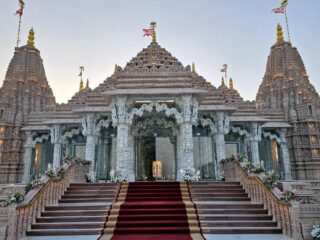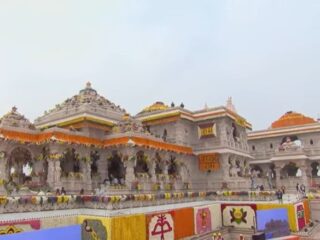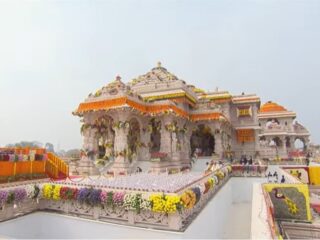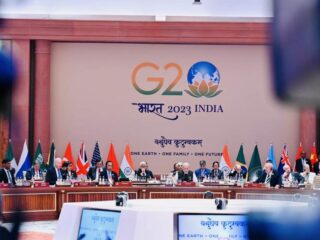Irfan Engineer
(Secular Perspective April-16-30, 2015)
The support of South Asian Dialogues on Ecological Democracy (SADED) and Vasudhaiva Kutumbakam (VK – whole world is my family) enabled me to participate in the World Social Forum (WSF) held in Tunisia in 2015. I had participated in the WSF in Mumbai and Nairobi. The previous experiences of participation in WSF were mixed. WSF brought together so many civil society organizations from all over the world working on issues that include environment, rights of the marginalized sections – including indigenous peoples, dalits, workers, gender justice, organizations that worked to make large and Monopoly Corporations accountable, writing off the debts of the third world countries, sustainable use of limited natural resources, de-escalating arms race in the world, abolishing nuclear weapons, opposing wars, decolonization of the world and liberation of occupied peoples, promoting pluralism and acceptance of diversity, accountable governance, empowered citizenship, deepening of democracy and many other issues. Activists and committed academicians and delegates from various countries and civil society organizations and movements participate in WSF. Getting to listen to and learn from so many experienced and learned people having experiences is itself a very exciting prospect. Even being in midst of so many people from various movements working for change and with optimism that “a better world is possible” is itself inspiring and energizing, and it helps fight doubts that sometime creep in some individuals whether another world is possible.
Even if another and a better world is possible, is a better outcome of WSF process possible? Some people see WSF as a cacophony of voices albeit of marginalized communities screaming to seek attention without resulting into tangible outcomes. In other words, they compare WSF to a supermarket of ideologies and perspectives where prospective “customers” visit a few shops but “buy” nothing. Other critical viewpoints suggest that WSF is not all that democratic and free space it is touted to be. The space is controlled by a few North based civil society organizations who are able to mobilize finances for the event. They set the priorities, decide the agenda and are indirectly in the position to determine who can speak at the event. It is the case of “march separately and strike against the status-quo separately” which leads to dispersion of energies for change in various directions and the status-quo emerges harmless in the process. If millions of Lilliputs (CSOs) resisting the oppression of Gulliverian Status-quo with its oppressive-destructive structures do not work in cohesion and organized manner to tie down and immobilize Gulliver, their energies will only get dissipated without achieving anything substantial with Gulliver emerging more powerful than before. The Gulliver representing arms industry, huge corporations, the neo-conservative-racist-nationalist-supremacist-patriarchal ideologists are more organized controlling media, educational and religious institutions to obfuscate realities and experiences of oppression of the people, propounding justifications for inequalities and social hegemonies forcing the world to open up for free movements of goods for unfair trade, free movement of capital to exploit global natural resources and cheap labour and protecting profits from taxation. The Gulliver also exploits cultural traditions to push its agenda to create more and more unequal world, poverty, hunger, destroying everything that is egalitarian in people’s culture, traditions and customs, moral values of religions and reinvent culture and traditions to promote selfishness, greed, individualism that pitches self in competition with the rest and against the whole society as a virtue; to promote ruthlessness, aggressiveness; to promote consumerism; to promote aping the ways of socially and politically dominant class; to make most brutal violence and manmade disasters acceptable; to make sexual violence and misogyny acceptable and call it all ‘modernity’. The Gulliver is destroying cultures of solidarity and values of empathy. The WSF is bringing the hundreds of liliputs together, is it helping them get organized? Even if WSF is a confluence of CSOs, if a CSO is better prepare and organized, it can avail of the space provided in WSF to network with other similar movements and organizations.
The WSF in Tunisia, as on earlier occasions acts more as a platform and space to take our organization’s concerns, perspectives and experiences to event and share with other and also seek out others working on similar issues or related issues and exchange perspectives and learn from others’ experiences and also network for solidarities. As a SADED and VK delegate in WSF provided ample opportunities to meet and interact with various organizations and movements that had come to attend WSF in Tunisia. That Tunisia was the venue of WSF was added attraction as that was the place where Arab Spring – people’s movement for democracy – had been launched.
Tunisia
One of my objectives in attending the WSF was to meet and interact with people from all over the world as well as from Tunisia. Though language was a barrier to communicate with Tunisian people, they were very friendly as we travelled in trains, buses and cabs. Partly relying on universal sign language together with some common words between English and French, and partly relying on observations on streets, I could to some extent overcome that barrier.
Tunisians were very friendly with Indians and had lot of regards and love for Indians. One of the reasons was that Bollywood films are very popular and younger generations could speak quite a few sentences in Hindi. In one shop, as soon we entered, the shop floor sales girl started singing, “I love India” for our benefit. Most Tunisians wanted to visit India, particularly the city of Bollywood. In Monastir (about 170Km from Tunis), when we entered a shop vending cereals and pulses and household utility items (what we call in India kirana shop), the shopkeeper went out of his way to explain what a particular flour was made up of, in spite of language barriers – he showed us sample of every grain that was included into the flour – what we later learnt was “bsisa” flour to which olive oil and sweetener could be added to prepare staple diet of Tunisians. He then added olive oil to the flour, mixed it himself to bsisa and gave it us to take it away and refused to take money for it!
We found Tunisian society quiet liberal and challenged our commonsensical and lazy understanding that Arabs are very conservative and fundamentalist in their religious opinions. We found Tunisian people very liberal and saw many women on streets wearing dresses of their choice – right from traditional to French/western. 99% of Tunisian people are Muslims – Arab-Berbers speaking Tunisain Arabic. The other 1% is Christians and Jews. We saw women with head scarf but they were fewer. We observed that even the head scarf didn’t come in way of men and women mixing freely in public space. Many WSF volunteers were students of El Manar University drawn from both sexes. They were interacting without any apparent inhibition or sexual restrictions – singing and dancing together and greeting each other with cheek to cheek contact. While the nearest Mosque was about half a KM from our hotel, during my entire stay, one thing was conspicuous by its absence – azaan – call for prayers, even though I used to get up at 5.00 am daily and leave the hotel at about 6.00 am for my morning walks in different directions. It is this liberal section that fought for democracy which movement is now popularly referred to as Arab Spring in 2011.
Though pork and alcohol are haram (not permissible to consume) in Islam, both were freely available and it was left to the individuals to follow their religion and not the state to prohibit, prescribe or regulate consumption of food and drinks. In the mall we saw meat looking like pork though we could not confirm it because the labels were in Arabic or French.
Just as Nehru led Indian National Congress adopted secularism and democracy as the founding principle of Indian state, so did Habib Bourguiba, who led the Independence Movement and the post-colonial Tunisian State. Education was one of the main priorities after Independence in 1956 for Habib Bourguiba. Even in 2005-6, the Tunisian Government allocated more than 20% of the budget for education. Education has largely been in French, particularly higher education and the process of Arabization is very slow. As a result, Tunisia is ranked 98 out of 182 countries according to the HDI 2007.
Under the leadership of Habib Bourguiba (1956–1987), Tunisia’s post independence government pursued a program of secularization. Bourguiba, was avowedly secularist who secularized education and unified the legal system so that all Tunisians, regardless of religion, were subject to the state courts. He restricted the influence of the religious University of Ez-Zitouna and replaced it with a faculty of theology integrated into the University of Tunis, banned the headscarf for women, made members of the religious hierarchy state employees and ordered that the expenses for the upkeep of mosques and the salaries of preachers to be regulated. Nehru had to withdraw Hindu Code Bill but Bourguiba introduced ‘Code du Statut Personel’ (CSP) the laws that govern issues related to the family: marriage, guardianship of children, inheritance and most importantly the abolishing of polygamy and making divorce subject to judicial review.
Bourguiba clearly wanted to undercut the religious establishment’s ability to prevent his secularization program, and although he was careful to locate these changes within the framework of a modernist reading of Islam and presented them as the product of ijtihad (independent interpretation) and not a break with Islam, he became well known for his secularism. For Bourguiba, Islam represented the past; the west was Tunisia’;s only hope for a modern future. The Islamists are fighting back for their space and exert considerable influence in the people. Muslim Brotherhood found its influence on people of Tunisia and so did Hizb ut-Tahrir. Ennahda Movement or Renaissance Party, a moderate Islamist Party, won 37% of popular votes and 41% (89 out of 217 seats) in the Tunisian Constituent Assembly elections in 2011. Today Tunisia provides highest number of recruits to Daesh or Islamic State fighters and attack on foreigners outside the Bardo Museum is indicative of the challenges faced the Tunisian State.
Economically Tunisia is facing lot of challenges of late. The backbone of their economy is production of olives and olive oil which also earns export revenues. Tourism is also important source of foreign revenues. Many Tunisians have emigrated and working in various countries. Their remittance is another source of foreign currency. Southern Tunisia has phosphate mining which is another source of revenue for the state. Fishing in the Mediterranean Sea also contributes to the economy. Of late, we were told that unemployment has increased. Tunisia has experienced its highest unemployment rates since the revolution of 2011. Youth between 15 and 29 years old constitute 72.2% of the total number of unemployed people in 2012. An article published on November 2013 by the Center for International Private Enterprise (CIPE) explained the reasons behind this economic decline leading to an increase in unemployment;
“Since Tunisia’s 2011 revolution, the economy has had a hard time regaining its pre-Arab spring growth rates. Al Qaeda’s presence in North Africa has grown in the last few years. Instability in neighboring Libya has only added to anxiety over the security situation in Tunisia, a country traditionally boasting healthy tourism revenues. Finally, demand for Tunisian exports has dried up in the European Union, Tunisia’s most important trade partner.”
The high rate of unemployment among youth is a cause of worry for the Tunisian rulers and a fertile ground for their recruitment by the political Islamists.




